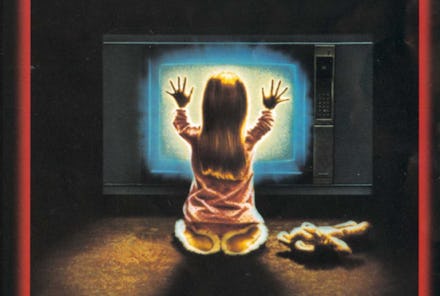Why horror movies gave me hope instead of nightmares

I was a weird kid. Most of the girls at my elementary school were into Care Bears, My Little Pony, and the Disney princesses of the day. I always loved the cartoony aesthetics of those characters and I was down with any excuse to collect stickers, but the saccharine stories didn’t hold my attention. I mostly pretended to watch because I knew that was what I was supposed to like them. What I really loved was horror movies — in particular, Poltergeist.
In case you missed this crucial pop horror delicacy, it’s about a little girl, Carrie Ann, who lives with her average but loving family in a generic suburban home. It’s all Big Wheels and pet birds named Tweety until she gets kidnapped by ghosts. Her family rallies together, and her mom has to go into the “unfathomable abyss” to rescue her, tethered to this world by a rope held by her loving father. Don’t question the science, here. Imagine it as a precursor to The Upside Down in 'Stranger Things'.
Even now, when I watch the scene where the parents kiss each other passionately before mom descends into the ghostly underworld, I cry. “Don’t let go,” mom says. “Never,” dad replies, “Now go get our baby.” Swoon. Those were the parents I wanted, determined to hold their family together. Carrie Ann was the kid I wanted to be, angry ghosts and all. She was more real to me than any princess. Bad things were happening to Carrie Ann and I could relate. Bad things were happening to me, too.
As a child, what I wanted most was for someone to rescue me, the way Carrie Ann’s family rescued her in Poltergeist.
My childhood was chaotic at best and abusive at worst. I changed schools over a dozen times before high school graduation. Sometimes we were evicted. Sometimes someone needed to avoid the law or an ex. Sometimes I had to be moved from one parental unit to another for my own protection. As a child, what I wanted most was for someone to rescue me, the way Carrie Ann’s family rescued her in Poltergeist. “Horror movies reflected your emotional reality,” explains Aimee Daramus, a Chicago-based clinical psychologist. “We look to the movies for situations and people that we identify with. As a child thinking about who you wanted to be, you found role models that worked with your experience.”
Disney princess narratives, to be fair, are also about being rescued. Women from poor but charming homes where they have to work hard (think Snow White and Cinderella) are whisked away to castles with servants, usually by princes on horseback. To me those narratives seemed condescending and there was something grotesque about their neon fakery. I didn’t want to live in a castle; I just wanted to survive long enough to become a grown up. And I wanted the people who loved me to help.
As I got older, I stopped believing I might be rescued. I wanted to become the hero of my own story. I graduated to classic serial horror films with heroic female leads. I loved Laurie in Halloween and Nancy in Nightmare on Elm Street. To be fair, a lot of delicate young women do die gruesome and scantily clad deaths in these movies, but often the main characters are teenage girls who don’t just survive attacks by monsters, they save everyone else too.
While other girls, usually prettier by traditional standards, are distracted by adolescent drama, Nancy and Laurie are hard-nosed. They figure out the mysteries behind the monsters. They might lose boyfriends and best friends to some dastardly fiend, and they may end up broken and bloody by the end of the film, but they always make it out alive, and they always save as many people as they can.
Their heroism appealed to me. I wanted to be powerful enough to break out of my own circumstances.“Part of being a child is being helpless,” says Daramus. Some people are drawn to power.” When bad things happen to you as a kid, she says, you have the choice of becoming like the people who hurt you — the “monster” — or like becoming the savior.
For me, the heroes resonated. I felt helpless and I knew there were monsters in the world. I wanted to be strong enough and good enough to defeat them. And whatever you want to say about the gory and exploitative nature of teen horror flicks, characters like Laurie and Nancy were courageous and resilient. I wanted that resilience.
This might be a little humble-braggy, but I am courageous and resilient. As a member of Adult Children of Alcoholics, I spend a lot of time with other folks who grew up in terrible circumstances. I see a lot of different examples of how humans overcome difficulty and cruelty. I meet a lot of people who have a really hard time not giving up. And I get it. The world is scary and it’s easy to feel defeated. But when life is really shitty, a little hope — even if it’s from a movie that isn’t meant to be particularly inspirational — can go a long way.
Daramus agrees that horror films could have played a role for me. “You learned that even in the worst possible circumstances, a good ending is possible,” she says. I found movies in which lionhearted women used their wits to prevail over evil. Those women gave me heroes to look up to. And to become.